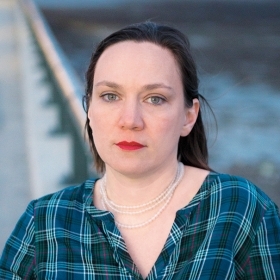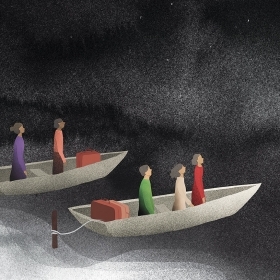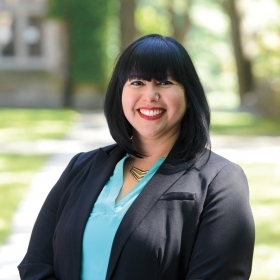In November 2023, New York City officials erected a tent city at Floyd Bennett Field, an out-of-use airport facility in a remote part of Brooklyn. Some 2,000 asylum seekers, all families with children, were settled there to face the winter ahead.
“This is my backyard,” says Ariana Hellerman ’03. “I live five minutes away, and my commute is on the Q35 bus, the only public transit that goes by Floyd Bennett Field.”
Most of the asylum seekers in the encampment are from Venezuela and Ecuador, with others from Peru, Colombia, Honduras, Mexico, Guinea, Senegal, Congo, China, Ukraine, Russia, Turkey, and Morocco.
It was easy to identify the migrants boarding the bus, because they didn’t know how to use their MetroCards at first. “I’m fluent in Spanish, so I started talking to people who got on,” Ariana says. “My ancestors came to New York and struggled. I felt a lot of empathy. I wanted to be an ally, figure out how to speak up for them and meet some basic needs. They were arriving in a New York City winter wearing flip-flops, T-shirts, and shorts. I thought, ‘This is not a question of politics. This is basic human empathy. We just need to make sure people have clothes.’”
Her effort began with four families, but the response was so overwhelming that Ariana became part of the organizing force around Floyd Bennett Field Neighbors, which started out with a handful of volunteers and has grown to more than 200.
“We’re not a formal organization,” she says. “We consider ourselves a collective. But through our organizing power, we spoke with the mayor’s office and the city and were the first mutual aid group to get permission to distribute necessities within the gates.” They have distributed clothing, footwear, coats, hundreds of baby strollers, suitcases, and more.
At one of the first distributions, a man approached Ariana. “I asked what he needed, and he said, ‘If possible, a guitar.’ That was so touching to me.
I work with a lot of musicians, and I knew I could easily find a guitar,” says Ariana, who produces free performing and visual arts events in public spaces in New York City. Another man said the next day would be his daughter’s seventh birthday. Could Ariana provide a cupcake for her? “On the day that I brought the guitar, I brought the cupcake,” Ariana says. “The guitarist played for the other man’s daughter, and we all sang ‘Happy Birthday.’”








We ask that those who engage in Wellesley magazine's online community act with honesty, integrity, and respect. (Remember the honor code, alums?) We reserve the right to remove comments by impersonators or comments that are not civil and relevant to the subject at hand. By posting here, you are permitting Wellesley magazine to edit and republish your comment in all media. Please remember that all posts are public.